In modern-day storytelling, gender swapping – or the act of placing female and non-binary characters in roles traditionally portrayed by cisgender men in movies, TV and web series – is a revolutionary way for actors and filmmakers alike to capture the experiences of people whose lives have rarely been explored in mainstream entertainment.
Gender swapping is also an important method for creatives on both sides of the camera to show audiences that the victories and hardships of LGBTQIA women and gender-neutral individuals are much the same as those experienced by their straight peers, which is one of many reasons why the groundbreaking web series Dinette has earned endless praise from critics and viewers from intimate living rooms around the world to the packed screening rooms of the prestigious Tribeca Film Festival, where it premiered in 2018.
Created by Shaina Feinberg, and making its long-awaited second season debut on September 24th on Brooklyn-based cable public access service BRIC TV while also streaming on BRIC’s web site and YouTube hub (linked to below), Dinette features female and non-binary characters taking over the roles commonly given to men, with Feinberg and her brilliant ensemble cast reversing the male-dominated “gathering of best friends” trope seen in movies like director Barry Levinson’s 1982 drama Diner (which inspired Feinberg to create Dinette).
Following the daily lives and loves of close-knit friends who frequent and work in a fledgling Brooklyn diner, Dinette co-stars Maeve Higgins as the struggling would-be comic Norah, plus Mona Chalabi as easily distracted journalist/UK ex-pat Lucille and Drae Campbell as Mick, the group’s emotional center whose past baggage continues to linger even though she’s done much to improve her personal life.

L-R: DINETTE co-stars Maeve Higgins (as Norah) and Mona Chalabi (as Lucille).
On the job, diner waitresses Dee (Donna Wood), Karolena (Karolena Theresa) and New York newbie White Rachel (Jaqueline Fouasnon) observe the friends’ conversations from afar, while two mute “clowns” (played by series co-producer/Feinberg’s real life spouse Chris Manley and New York’s Worst Landlords host Jeff Seal) wreak comic havoc in the background.
The silent treatment given to Manley and Seal’s wacky troublemakers and to the diner’s chef (Marshall York) shows the reversed dynamic between men and women in Dinette.
Picking up where season 1 of Dinette left off, the upcoming six new episodes of season 2 present a new challenge to the longtime friends when their beloved diner’s owner unexpectedly dies, leaving the future of the place even more uncertain when it’s taken over by Mick’s ex-girlfriend/ambitious businesswoman Luisa (Alysia Reiner). While Mick and Luisa deal with themselves and their own unresolved feelings, the continuously relevant subject of immigration in America comes to the fore in a secondary storyline where Lucille and Norah come to the aid of a church-bound Syrian refugee (Jamal, played by Karim Nematt) who aspires for a better life and new opportunities in the States.
With Dinette‘s second season completed just 6 weeks before the COVID pandemic wrought untold destruction throughout America in March of 2020, and with the show’s return now forthcoming after being delayed for over a year, Feinberg spoke to me about how season 2 of Dinette will continue to capture the experiences of female and non-binary communities through the realistic characters featured in her series, and how productions like hers are already changing how the entertainment industry portrays both of those communities.
Chris Hadley: You mentioned how seeing the movie Diner inspired you to make Dinette. Having seen it when you were a kid, and having analyzed how women had very minor roles in that film as opposed to men, you effectively reversed that imbalanced dynamic in this series. Describe how that reversal plays itself out, not just in the overall idea of the show, but also in the characters and their experiences as seen in both seasons of it.
Shaina Feinberg (creator, Dinette): I’m working to get more female and gender nonconforming characters in the lexicon and I’m working to give them better roles and more three-dimensional character traits. So I think what happens is that I’m allowing my characters to be funnier; more annoying, maybe. It’s not just about them getting to be funnier or (them) having more lines. It’s also about them getting to be annoying and getting to be like a real person.
I think so often in movies and TV shows, (or) at least the ones that I grew up watching, the women were there to orbit around men and they were there to look good, or maybe they were there to just give directions like, “go that way!” or to bring food to them. So this is, for me, an opportunity to have these characters just be totally human. I think that’s what I’m doing with this series and in general, with all my work; just letting women and gender nonconforming people have all of these different kinds of experiences on camera.

The waitresses of DINETTE. L-R: Jaqueline Fouasnon (as White Rachel), Karolena Theresa (as Karolena) and Donna Wood (as Dee).
For example, in episode 3 (of season 2), the main ensemble cast is hanging out, and they’re all just kind of peacocking. One of them is rapping. One of them is breakdancing. One of them is singing and they’re all just hanging out.
I remember the day (this scene was filmed) and feeling like this is important to me as a female filmmaker because it just felt huge to be doing this thing with these people, who I don’t normally get to see, (and seeing them) just being human, and being funny, and cool, and annoying, and silly, and goofy, and not just having to serve a man’s story.
In that same episode, it starts with two of the characters, who are both gender queer, doing a scene from The Godfather. I think that’s a thing that I just love to do; to take these scenes that I grew up watching and turn them on their head, and have them be performed by other women or gender non-conforming characters.
CH: Besides Diner, what else inspired you to make Dinette? In what ways, if any, did real life inspire and influence the show’s concept, storylines, and characters?
SF: I was just inspired by everything I watched (Diner, Mel Brooks and “Pink Panther” movies, plus the infamous 1987 Dustin Hoffman/Warren Beatty flop Ishtar). In terms of real life, when I was doing press for the first season, it was funny. Someone asked me, “are you these characters?” or something like that. I realized in giving the interview (that) actually almost all the stories or all the circumstances that these people get into are things that have happened to me or to my close friends. So they’re all really inspired. I have one of my best friends, Julie Showers, (who) I did a public-access TV show (with) for 7 years, and a bunch of the stories are inspired by things that happened to us, or to her, or to me when we were together doing that. So in a lot of ways, every single character is kind of based on me, (or) of the main ensemble cast.
CH: In terms of the production quality and the pre-production phases of the show, what were those processes like? How did the show’s production quality improve and evolve from what it was in season 1?
SF: The pre-production is fast because, basically you get green-lit (and) you are like, “am I going to get green-lit?” for so long. Then you eventually get green-lit and you have to do it by a certain date, and you have maybe 8 weeks. So, it’s fast. It’s like I have outlines for the scripts and then I get green-lit and I write them all. Then my producer, Lis (Durkin) and I start scheduling everyone, and doing locations, and crewing up. For example, in December 2019 when we were prepping for season 2, we were like, “should we just push this off ’til March?” because we couldn’t get this one location. Then a location came through and we were able to film it in January, and thank God (we got it) because by March everything had shut down because of COVID.
Our pre-production is fast and furious. Really it’s me, and Lis Durkin, my producer, and also my partner and husband, Chris Manley (one of the two mute male “clowns” in Dinette). The three of us are doing all the pre-production. Then in terms of the production value, I mean, we got a nicer camera for season two. We also got to film in a church, which was super fun. Production value in that was cool. We didn’t have to do any set decorating for a church, (because) there (were) real stained glass windows. That was really awesome. The final episode has a marching band in it, and that was really cool. That helped our production value.

DINETTE creator Shaina Feinberg. Photo courtesy: Julie Showers.
CH: How did the pandemic affect your plans for season 2?
SF: We wrapped on January 22nd, and then 6 weeks later the world had shut down, and we were in post. So we continued to just edit it, and color it, and do sound, and do all that stuff, but I definitely think (the COVID-19 pandemic) affected us because we imagined (season 2 of Dinette) coming out sooner.
Then the world really shut down and then it was just sort of hard to move anything forward for a long time. Then we went to some festivals, and then I was really eager to get it out earlier, but I’m working in concert with BRIC and they have all their programming, so we had to take our time to get it all together, to come out. I think the pandemic definitely pushed (season 2’s debut) back a year, I’d say.
CH: Any plans for a third season?
SF: I have an outline in a pitch deck for season 3. We’ll see what happens. I mean, I didn’t know that a season 2 would happen, so I guess I’m just open to it. I always think, “Oh, that’s the end of that,” but then people really liked season one. So then I actually got to pitch it as a TV show in L.A. That was really cool because (in) every room I went into, the people had seen it. I didn’t wind up selling it, but just the fact that that opportunity popped up led to me getting a season 2 (of Dinette). So I don’t know what will happen. Maybe there’ll be a season 3, maybe not. I’m constantly working on other things, so I’m not sitting around waiting for season 3, but if it happens, it will be fun. I have a whole outline of what will happen.
CH: Besides its authentic and realistic look at female friendships and relationships, what else do you feel makes Dinette unique from and similar to other web series, movies, and TV shows geared towards women?
SF: I guess what makes it different is that I’m not really trying to gear it towards women. I just wanted to make something that featured people like me. I don’t know. There’s an absurdism in it that might not always exist in other things. For example, the clowns that don’t get to speak, really, is sort of absurd, but what makes it similar is having similar kinds of characters, like the mix of women and gender queer folks. I feel like that’s getting seen more now, which is cool, (and) which I’m very happy about.
CH: Tell me about how Dinette has provided, and continues to provide, opportunities for female and the LGBTQIA actors and filmmakers to succeed in the industry.
SF: In Dinette (there’s) a very diverse world and cast, so I think some of the people who were in season 1 got a lot of opportunities from getting to be seen like that. I think it helps open the gateway for people to get more roles, and to have something that’s of a certain quality on their reel. It gets seen at festivals, it gets press, it gets people to see it, and then they realize,”oh, okay, I can use this person in this way.” So I think it helps. It’s just one of the many TV shows and web series and movies out there that’s starting to show people all kinds of people.
I think more and more folks are being like, “oh, okay, well, so this character that I wrote as a guy doesn’t have to be a guy, it could be played by Drae Campbell,” or whatever. For example, I know of an instance where someone wrote a therapist character for a man and then they wound up casting Drae, and Drae did an amazing job. I mean, she’s an incredible actor, but I think that (the) stuff that I’m making is opening people’s minds to (see) that “oh, okay. I can cast all kinds of people.”

L-R: Drae Campbell (as Mick) and Michelle Hurst as a nun whose church has become a safe haven for Syrian refugee Jamal (Karim Nematt).
CH: Overall, how has making Dinette impacted you as a filmmaker?
SF: Dinette just hit a nerve with people in a way that other things of mine haven’t, so that was really cool. I honestly did not expect that. It’s opened up some doors for me. I’ve gotten hired by places to make things for them, but I’ve also just made a ton of stuff for shoestring budgets. So it’s been cool to make something of my own, but having a little funding to do it, and getting to not just shoot in my apartment or on the street, but use a diner or a church or whatever. To be in charge of a bigger crew just feels like, “oh, okay, cool! (These are) baby steps to getting a TV show.” So that’s exciting.
CH: Finally, what do you hope people take away from watching Dinette?
SF: Ultimately I’m making comedy, but I am making nice comedy and my characters like each other, and I hope that it gives people hope for the world. That’s what I ultimately want; for people to feel warm and good from watching my stuff, and (for them to) feel like they have friends. It’s easy to feel very hopeless not just with the pandemic, but with climate change and racism and sexism. I feel like my characters feel the pressure of those things in the world, but they also continue to laugh and hang out and have moments of levity and (of) feeling close to people. So I hope that people take that away from the series.
NOTE: Feinberg says that all episodes of Dinette’s second season will be closed-captioned.
The full YouTube playlist for season 2 of Dinette can be accessed here (episodes go live on September 24th):
https://www.youtube.com/watch?v=dX6lNSPWS-U&list=PLX1W43ZgDnWEqULkozLaaeZdfg2zRV-ER
Watch both seasons of Dinette on BRIC’s YouTube channel:
https://www.youtube.com/c/BRICTV
And on BRIC’s official web page:
https://www.bricartsmedia.org/tv-shows-videos/dinette
Find out more about Shaina Feinberg’s work on her official website:

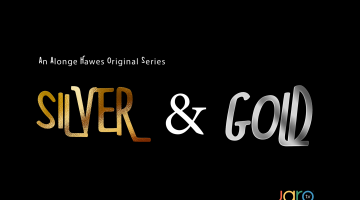
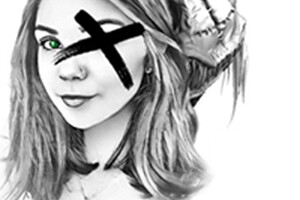

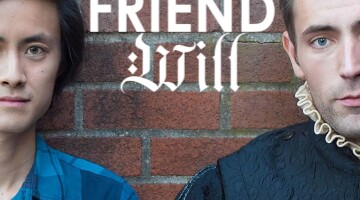
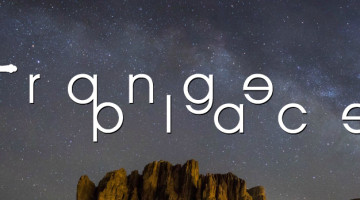
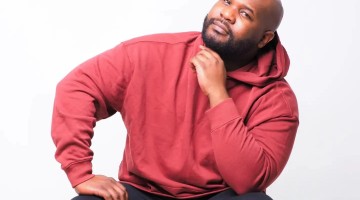
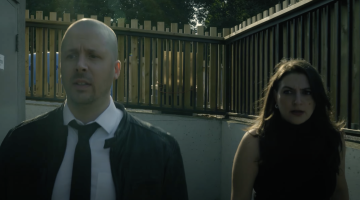
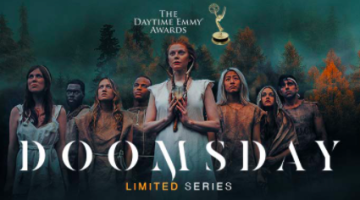

No Comment